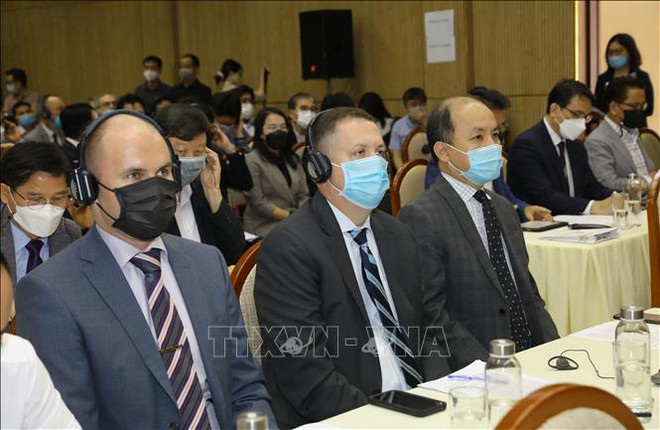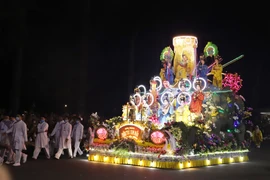 Representatives of foreigners’ places and groups for practice religions in Vietnam at the meeting in Hanoi on April 27 (Photo: VNA)
Representatives of foreigners’ places and groups for practice religions in Vietnam at the meeting in Hanoi on April 27 (Photo: VNA)The event was attended by officials of theGovernment committee, the Ministry of Home Affairs, relevant ministries and agencies,and localities’ committees for religious affairs, along with dignitariesrepresenting 43 places and groups for concentrated religious practices offoreigners.
Vu Chien Thang, Deputy Minister of Home Affairsand Chairman of the Government Committee for Religious Affairs, said Vietnam’sstrong integration into the world has attracted a large number of foreignentrepreneurs and businesses. Many of foreigners working, studying, and livingin the country have beliefs or religions, thus having the demand for religiouspractices.
He emphasised Vietnam’s policy of respecting andprotecting all people’s right to freedom of belief or religion, noting that the2013 Constitution recognised the right as one of the fundamental human rightswhile the Law on Belief and Religion, adopted by the National Assembly onNovember 18, 2016 and coming into force on January 1, 2018, detailed this rightof all people, including foreigners legally residing in Vietnam.
In fact, foreigners legally residing in thecountry have had their right to freedom of belief or religion ensured in linewith legal regulations, Thang went on.
Local authorities have created conditions fortens of foreigners’ places and groups to practice religions at legal sites inVietnam. Meanwhile, foreign dignitaries are allowed to preach at places orgroups of concentrated religious practices. Foreigners are also permitted tobring religious publications and items to serve their practices, according tothe official.
He expressed his hope that the dignitaries andrepresentatives of foreigners’ places and groups for religious practices willnot only help introduce the land, people, and religious life in Vietnam, butalso correctly present the country’s relevant policies and legal regulations toother foreigners.
At the meeting, participants learned about thebasic contents of the Law on Belief and Religion, the rules on exit from andentry into Vietnam, and the provision of online public services related tobelief and religion.
They also discussed issues relevant to therealisation of foreigners’ right to freedom of belief or religion to helpbuild a healthy religious life in the country./.





























